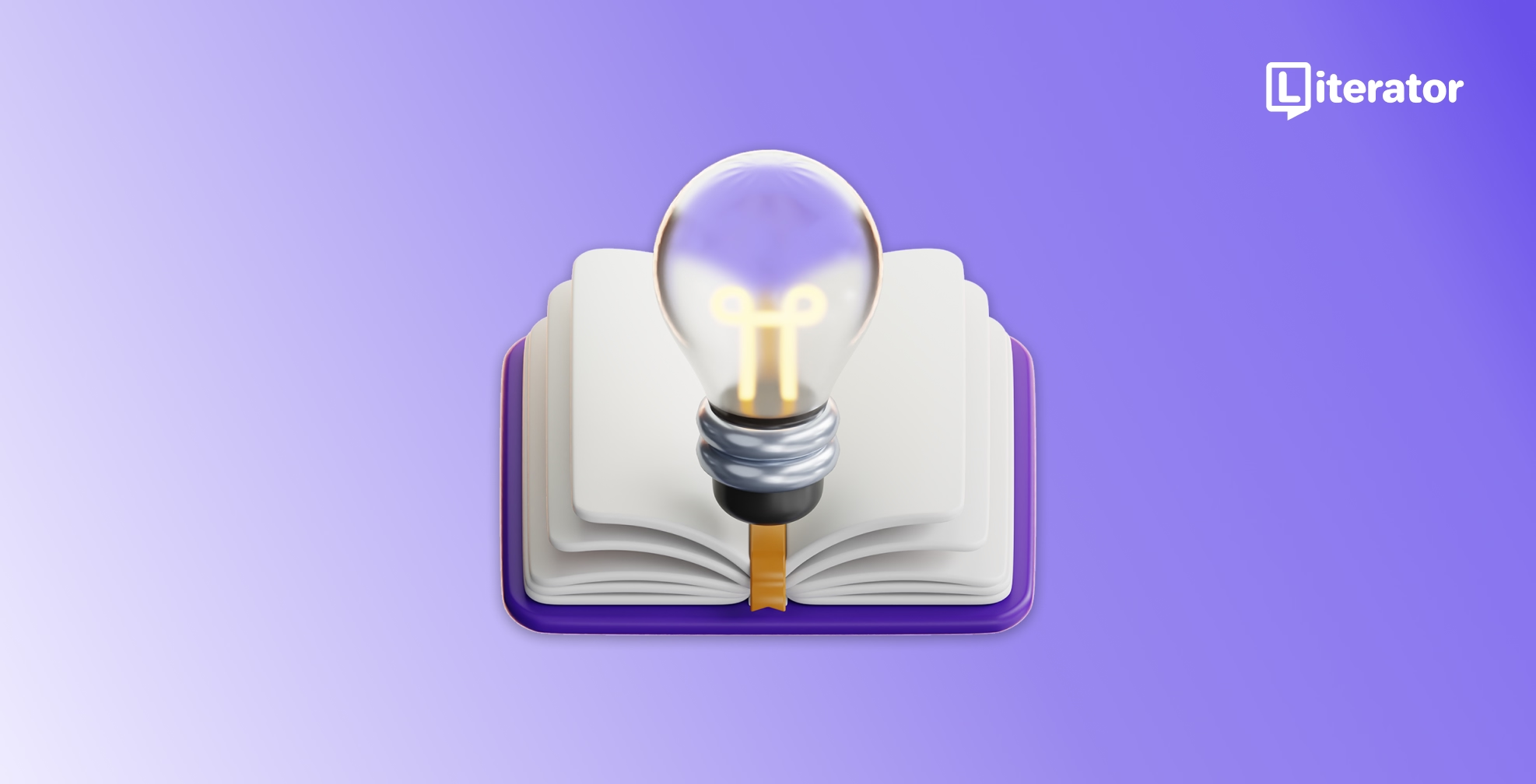Besides, reading improves your vocabulary, critical thinking, and communication skills and keeps your brain healthy. There is, however, more to it. This guide explains how multiple aspects of reading (gamified, multilingual, and others) affect brain development. Also, it discusses the best tool for reading books despite their commitment to their work, family, and others.
How Does Reading Improve Intelligence?

Whether learning new words or enjoying a story, there are multiple reasons to read a book. Beyond these, reading also improves your intelligence.
Improves Vocabulary
One can attain proficiency in a language when one knows how to use the right words while speaking or writing. Reading provides the exact context of the usage and helps you memorize the word much faster. The more you read, the more you learn and become a better speaker or writer.
Improves Creativity
Reading activates the brain's occipital lobe, which is responsible for processing visual information. And it opens a new realm of imagination. So, when you read a non-fiction book, you make characters and worlds real in your mind.
The more you read, the more creative you get, and you start to apply creative visualization in various aspects of your life. It also trains the occipital lobe of your brain to help you make better decisions.
Improves Critical Thinking
Reading introduces you to a new concept and worlds to encourage creativity and new ideas. This way, you can find new and unique solutions to everyday challenges in life, be it high school, work, or relationships. Sometimes, you may only get the correct answers, but reading helps you brainstorm new ideas to solve a problem.
Improves Comprehension
Reading also improves comprehension by helping readers understand the main idea and answering questions about what they have read. The more you engage in a story, the more your brain exercises to process and learn information faster.
Audiobook vs. Reading Comprehension – Which Is Better for the Brain?
Reading comprehension and audiobooks effectively improve cognitive skills, but the benefits depend on individual preferences and learning styles.
Reading Comprehension
Reading a book requires readers to process new information every time. It, in turn, facilitates cognitive functioning and active concentration. It also helps learn new words, understand better, and improve critical thinking skills.
Readers can highlight a part of the book to which they can turn back at any time. Reading books further provides them with the flexibility to control their learning pace. They can speed through the manageable sections and delve deep into the complex ones for a customized learning experience.
Audiobook
Rather than scrolling through social media, listen to audiobooks to learn faster and better. When information is orally fed to you, it engages your auditory senses to stimulate imagination and enhance comprehension for a memorable learning experience.
That is not it. It makes books accessible for readers with learning difficulties or visual impairments. It also allows you to multitask while obtaining new information.
In particular, the Literator app provides book summaries so you can complete a book much faster. It also improves your working memory and helps you retain information much better and quicker.
If traditional reading is challenging, audiobooks can provide an accessible and effective alternative. For practical tips and insights, read this article on
Trouble Reading? Try These Workarounds
from Harvard Health.
Narration Style for Better Understanding

The narrative style of a story also influences what a reader feels about the character and the overall story. For example, a reader aligns more with the characters of an intimate narrative than others. The following are the benefits of narration style:
- Shaping a Reader’s Perception: How a narrator tells the story determines how well a reader connects to the characters and emotionally aligns with them. The better the narrative, the better a user understands the world, believes, and perceives reality.
- Provide Background Information : Narrative styles allow readers to obtain detailed information about the characters and setting, which helps them understand the story better.
- Visualization : A narrative style that captures the essence of a story helps the reader visualize and understand it better.
Literator excels in this respect, allowing users to find a narrative style that fits each piece of content perfectly. Users can choose between the available narrative styles to make the story more immersive and unforgettable. You can also add background music to the story to ensure a relaxing and comforting listening experience.
How Does Multilingual Reading Affect Brain Development?

Now that the world is more connected, multilingual reading is more important than ever. Research suggests that a bilingual brain functions much better than a normal one. There are other benefits to it, which are as follows:
- When one reads and writes in multiple languages, it activates the brain and enhances cognitive abilities. Children who receive multilingual education have better creativity, problem-solving skills, and creativity.
- Opting for a multilingual education boosts the child's information retention ability. Students must learn the new grammatical rules and vocabulary, improving their information-retention ability.
- A child with better cognitive skills and memory retention understands complex concepts better and performs well in academics.
- A multilingual education paves the way for learners to understand different cultures, people, and ways of life. It helps them develop empathy and better navigate cultural differences in the future.
- Lastly, people who speak multiple languages have a lower risk of developing dementia or cognitive decline. Bilingual education requires exercising your brain almost every day and keeping it in a much better state than others.
Literator stands out as a top choice for people learning new languages or practicing learning in another language. You can read or listen to its rich collection of books in more than ten languages and improve your brain's cognitive ability.
Why Are World Classics Important for Intellectual Growth?
World classics are synonymous with intellectual growth. They help learners gain valuable skills and become better thinkers, writers, and problem solvers. This allows people to make better decisions, devise solutions, and successfully take on challenging tasks.
Prepare for Higher Education and Career
Reading classical literature better prepares learners for their higher education and future careers. It teaches them about past cultures and how creative and intellectual ideas shaped today’s world. Classics also present critical concepts that require careful consideration, and by reading them, learners develop essential thinking abilities and understand the lessons.
Boost Your Complexity of Thoughts
One of the benefits of reading timeless works is the ability to understand complex thoughts and writing styles. The novels of Shakespeare and Plato offer unique perspectives and encourage more profound thought and analysis. Also, the expression style differs significantly from modern literature, further fostering communication ability and writing style.
Facilitating Language and Cultural Learning
World classics provide an opportunity to understand better language and how writing is intertwined with culture. Poetic dramas like Julius Caesar and Romeo and Juliet can be great examples in this respect.
Readers can develop the skill of unusual and untangling sentence structures and recognize poetic omissions, compressions, and wordplay. Reading through these also provides an idea of the culture at that time.
Help Students Grow as a Person
World classics help readers understand the world in which they live and can grow as people. They force readers to engage in critical thinking and allow them to explore their beliefs, values, and opinions. Ultimately, these help teenagers and children become more well-rounded individuals.
Literator provides literature enthusiasts with a unique way to read and experience classic literature through visuals, summaries, and voiceovers. It captures the true essence of classics without spending days and months reading them. Also, its multilingual support and other features are great for anyone looking to engage in interactive reading.
Are Book Summaries Effective for Smarter Reading?
In a fast-paced world where people have less time to read, book summaries are an excellent solution. One can smart read with book summaries to save time, capture insights, and improve retention. The benefits are as follows:
- Time Efficiency : Busy professionals often need help finding time to read due to family, work, and other commitments. Apps like Literator allow you to read a book within minutes while simultaneously multitasking.
- Comprehensive Insights : Unlike other platforms, Literator captures the critical points for readers to understand the book's core concepts well.
- Improved Retention : Clear and concise information sticks in your brain for longer. Literator is a book-reading app that skims complex ideas and feeds digestible nuggets to readers for improved retention.
- Cost-Effective : Investing in a Literator subscription plan saves you thousands of dollars on hardcover or digital versions of books. Plus, you have access to thousands of classic and modern literature.
- Increased Productivity : Reading book summaries with the Literator cultivates a habit of consuming information efficiently. Professionals can simultaneously use this newfound skill to complete tasks and a few books.
Conclusion
So, whether reading makes you smarter is yes, provided you do it right. You must read world classics and learn multiple languages to develop critical thinking skills. It further helps you grow as a person.
Literator is an excellent platform for accessing thousands of good books. It provides a collection of hundreds of modern and classic literature in summary form and multiple languages. Also, its concise summaries help you retain the information much better and be more productive. So, try it for free now!
